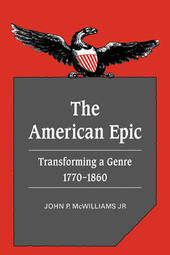
|
The American Epic: Transforming a Genre, 1770-1860
Paperback / softback
Main Details
| Title |
The American Epic: Transforming a Genre, 1770-1860
|
| Authors and Contributors |
By (author) John P. McWilliams, Jr
|
| Series | Cambridge Studies in American Literature and Culture |
|---|
| Physical Properties |
| Format:Paperback / softback | | Pages:296 | | Dimensions(mm): Height 229,Width 152 |
|
| Category/Genre | Literary studies - c 1800 to c 1900 |
|---|
| ISBN/Barcode |
9780521107020
|
| Classifications | Dewey:811.03209 |
|---|
| Audience | | Professional & Vocational | |
|---|
| Illustrations |
Worked examples or Exercises
|
|
Publishing Details |
| Publisher |
Cambridge University Press
|
| Imprint |
Cambridge University Press
|
| Publication Date |
2 April 2009 |
| Publication Country |
United Kingdom
|
Description
John McWilliams's 1990 book was the first thorough account of the many attempts to fashion an epic literature (the anxiously anticipated 'American Epic') from a wide range of potentially heroic New World subjects. At the outset, McWilliams considers the many problems - cultural, political and literary' - of adapting Enlightenment views of republican progress to a genre that had traditionally celebrated the greatness of warriors. After a survey of the many epic poems written during and after the American Revolution, McWilliams shows how and why the epic had to be transformed from imitative narrative poetry into the new, open genres of prose history (Irving, Prescott and Parkman), fictional romance (Cooper and Melville) and free verse (Whitman). Believing that reviews are an important and slighted agent of literary change, McWilliams has written his book in the form of chronological literary history. His book, however, is no march of dates within tired categories. The American Epic suggests that imaginative writers of the Romantic era were in fact far less proscriptive about the boundaries of literary genre than many a twentieth-century writer and scholar.
Reviews"...an important book that fills a gap in our knowledge and strengthens our understanding of 19th-century literary culture." Choice "McWilliams surveys the work of Barlow, Dwight, and Trumbull with a sharp eye toward the rhetorical work each must perform introducing his epic to the public, revealing the discomforts each feels in suiting vehicle to message." David S. Shields, The Eighteenth Century
|